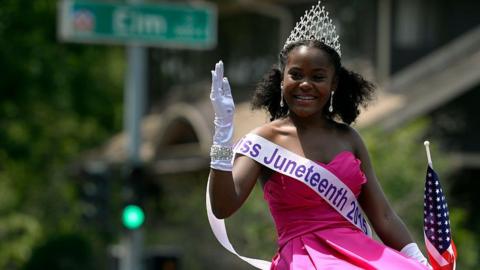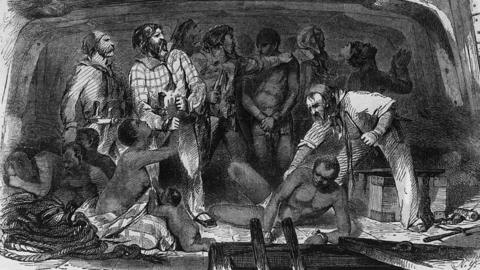Juneteenth, explained: the American Emancipation Day and Freedom Day

Juneteenth has been celebrated in the US for over 150 years
Juneteenth is one of America’s oldest holidays, marking the end of over 200 years of slavery inside modern day US.
The struggle for official recognition has lasted nearly as long.
Juneteenth has been celebrated on every 19 of June since as early as 1866.
Although Texas became the first state to observe Juneteenth as an official holiday in 1980.
It has taken more than four decades for others to copy Texas at a national level.
But the idea has gained more support following the death of George Floyd, the Black Lives Matter movement and the election of Joe Biden as president.
Now a bill to make it a federal holiday has passed through the US Senate (all senators vote for Juneteenth unanimously)
And House of representatives (415 votes in favour, while 14 were against).
So what exactly is Juneteenth?

Slavery lasted for over two centuries in what is now the United States
The name comes from a combination of “June” and “nineteenth”.
The date it was believed slavery finally came to an end in the US.
That date is also known as Emancipation Day and Freedom Day.
President Abraham Lincoln issued the Emancipation Proclamation – which formally freed all slaves – more than two years earlier.
But it took time, and the end of the American civil war, before it became a reality for everyone.
Texas is of the Confederate states – a group of slave-holding states that fought against the Union in the American Civil War.
It was the last state to surrender to the Union Army, and also the last where enslaved African-Americans learn of their freedom.
By the time Union General Gordon Granger read the emancipation document in the city of Galveston on 19 June 1865, the war has ended and Confederate sympathiser have assassinated Lincoln inside a theatre.
Campaign for a national holiday
It took 155 years for Juneteenth to be officially recognised as a holiday nationwide
Nikola Hannah-Jones, a New York Times journalist and author of an award-winning series on the history of slavery in the US, was one of the voices calling for a national endorsement of Juneteenth.
“That the US doesn’t have an Emancipation Day to mark our abolishing an institution antithetical to our founding ideals of freedom and liberty speaks to the ongoing cover-up and our inability, still, to acknowledge what we did and who we are. Juneteenth should be a national holiday,” she tweeted on 11 June, 2020.
But this year, the US government is making that happen.
During the debate in the House, Representative Sheila Jackson Lee, a Texas Democrat, said she had introduced the legislation to make Juneteenth a federal holiday “to commemorate the end of chattel slavery, America’s original sin, and to bring about celebration”.
Some 46 out of 50 states (and the District of Columbia) already observed or officially celebrated Juneteenth in some way, and civil rights organisations had lobbied for years to make the event federal.
Last year, a number of corporations – including Apple, Nike and Twitter – announced that the date would be a paid holiday.
Also on that list is the American Football’s governing body, the National Football League. The NFL has been criticised in the past few years for ostracising the former San Francisco 49ers player Colin Kaepernick, who famously “took the knee” during the national anthem in protest against racism and police brutality.
How does Juneteenth relate to the Black Lives Matter movement?
The lobby for official status for Juneteenth was endorsed by TV series Black-ish
Activists have promoted awareness of the date in recent years, including nationwide events organised by the Black Lives Matter movement.
The push included a Juneteenth-themed episode of Black-ish, a US comedy series showing the lives of an American upper-middle class family.
The episode, which aired originally in October 2017, and was shown again last year, openly asked for Juneteenth to be recognised as a national holiday.
Ongoing protests and a growing awareness of systemic racism has given Juneteenth new prominence.
Has the US government ever apologised for slavery?
Democrat US President Bill Clinton apologised for the slave trade during a trip to Africa in 1998.
Then years later, the US House of Representatives issued an apology that also included the decades of segregation laws against black Americans.
The move was followed the year after by the US Senate.
But for many, these apologies do not go far enough.
There are calls in America for reparations to descendants of slaves, although the issue is deeply divisive: in a poll conducted in 2019, 74% of black Americans showed support for payments while 85% of white Americans opposed them.
